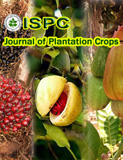Review of economic history of cocoa with special reference to India
DOI:
https://doi.org/10.25081/jpc.2018.v46.i2.3727Abstract
Forceful means of colonialism and imperialism conditioned the local farmers in the tropics to grow cash crops like cocoa for export. Emergence of cocoa cultivation in India indubitably was a part of the commercialization strategy adopted by the Cadbury. During 1970s, attractive prices prevailed in the world market which coupled with cadbury’s aggressive efforts to commercialize the crop, yielded fruitful results in India in the form of high growth rate of area expansion. We found an entirely opposite trend during 1980s when a large number of farmers started cutting down cocoa trees due to the sudden price crash of the crop. The victims of market failure were mainly farmers who did not possess an effective machinery to insure themselves against economic uncertainties. We have made an attempt to view the cocoa development history in India in the perspective of ‘Global Value Chain’. We argue that the governance structure that existed during the initial stage of cocoa commercialization in India was somewhere between captive and hierarchy, which certainly had culminated in unequal exchange of trade. At present, due to concentration in the downstream end of the cocoa value chain, the cocoa producers are marginalized in terms of revenue share and bargaining position in the chain.







 .
.